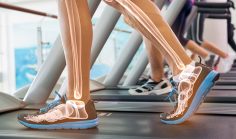Psoriasis is an autoimmune disease in which skin cells grow too quickly, causing them to rapidly accumulate on the surface of the skin. These excess cells can result in patches of red skin or thick, silvery scales that can itch, sting, or burn. Psoriasis can also affect nail growth and appearance, or even cause skin sores. Psoriatic skin patches are most commonly visible on a person’s torso, knees, elbows, and scalp, but they can develop elsewhere, including on the palms, soles, knees, genitals, nails, or even on the face. The abnormal patches of skin are often symmetrical, appearing in the same areas on both the right and left sides of the body. This chronic condition is the most common autoimmune disease in the U.S. The National Psoriasis Foundation estimates that up to 7.5 million Americans (a little more than 1 in 50 people) have it.
There are 8 types of psoriasis:
- Plaque psoriasis is the most common kind, causing red, dry skin lesions, covered with silvery scales. These can occur anywhere on the body.
- Nail psoriasis can make nails grow abnormally and become discolored or pitted. The nails may also separate from the nail bed, or be crumbly.
- Scalp psoriasis causes red, itchy patches covered with silvery scales, possibly visible beyond the hairline. Flakes of dead skin may frequently fall on the person’s shoulders or lodge in their hair. Scalp psoriasis bears some similarity to dandruff (seborrheic dermatitis). Both cause itching, but dandruff is more superficial; flakes come off easily from the scalp, and it is easily treated with over the counter products.
- Guttate psoriasis is more common in kids and young adults, often after they’ve had a bacterial infection such as strep throat. The telltale symptoms are small sores, shaped like water droplets, on the trunk, limbs, and scalp. The sores aren’t as thick as typical psoriasis plaques are, and their scales are finer. While the person may suffer repeated outbreaks, guttate psoriasis can also be a one-time event.
- Inverse psoriasis makes patches of skin become red, smooth, and inflamed. It’s mostly seen in the armpits, groin, around the genitals and under a person’s breasts. It may often be triggered by a fungal infection, and can worsen with friction or perspiration.
- Pustular psoriasis is uncommon and occurs on either large skin patches or small ones around the hands, feet, or the tips of the fingers. It generally comes on quickly: First skin becomes red and tender, then, within hours, pus-filled blisters form. These blisters may come and go frequently; and flare-ups may be accompanied by itching, fever, chills, and diarrhea.
- Psoriatic arthritis not only can cause scaly, inflamed skin and pitted and discolored nails, but can make a patient have painful, swollen joints. This can potentially lead to stiffness or even deformity in the most severe cases.
- Erythrodermic psoriasis is the rarest, consisting of a red rash that peels, and can severely itch or burn. It may cover the patient’s entire body.













